Afghanistan War, CIA Sponsored Terror, Civil Liberties, Criminalizing Dissent, FBI Intrusion, Habeas Corpus, Human Rights, Political Prisoner, Prison Industry, Surveillance, Targeting Muslims, Torture, War Resister
Podcast: Play in new window | Download
Updates:
- Lynne Stewart Turns 74
- Phone Campaign For Lynne Stewart To Be Let Out Of Prison Under Compassionate Release
- Director of Federal Bureau of Prisons – 202-307-3250
- U.S. Attorney General Eric Holder – 202-353-1555
- U.S. President Barack Obama – 202-456-1111
- Che Guevara Anniversary
- Shocking Statistics On Americans Under 30
—–
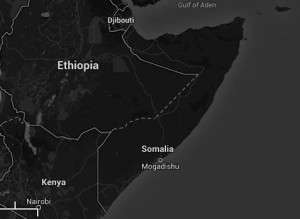
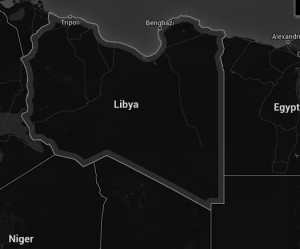
The United States Military Kidnapping In Libya And Failed Kill or?Capture In Somalia
The United States military had gone into 2 parts of Africa. In one case they went into Libya and brazenly seized a man who they claim to be a leader of Al-Qaeda, his name is Abu Anas al-Libi. He was seized out of Tripoli, Libya. The U.S. also went into Somalia and attacked a house or a compound in apparently an effort to grab or kill an alleged senior leader of the Somali group al-Shabab. Michael Ratner reports in this update.
Attorney Michael Ratner:
- It was shocking news to see that the United States think it can go into sovereign countries and kidnap, kill whoever they want. Did the US have the right to go into Libya at all?
- Article 24 of the UN Charter says that the territorial integrity of the a country is complete, except of the case of self-defense or authorized by the UN.
- There was no authority by the UN or international law to go into Libya.
- Then the question came up – Did Libya consent to it?
- He’s on some U.S. ship. It’s called the San Antonio.
- They’re keeping him floating on this ship while they’re going to interrogate him.
- Its true, Obama when he took office 5 years ago, he banned torture and he said all interrogations had to be done according to the Army Field Manual.
- Annex M allows 3 kinds of techniques that I think constitute cruel and inhuman, degrading treatment and taken together would constitute torture.
Law and Disorder Co-host Attorney Michael Ratner, President Emeritus of the Center for Constitutional Rights (CCR), a non-profit human rights litigation organization based in New York City and president of the European Center for Constitutional and Human Rights (ECCHR) based in Berlin. Ratner and CCR are currently the attorneys in the United States for publishers Julian Assange and Wikileaks. He was co-counsel in representing the Guantanamo Bay detainees in the United States Supreme Court, where, in June 2004, the court decided his clients have the right to test the legality of their detentions in court. Ratner is also a past president of the National Lawyers Guild and the author of numerous books and articles, including the books The Trial of Donald Rumsfeld: A Prosecution by Book, Against War with Iraq and Guantanamo: What the World Should Know, as well as a textbook on international human rights.
—-
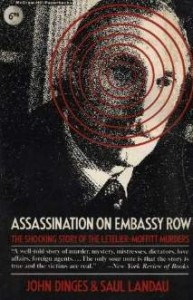
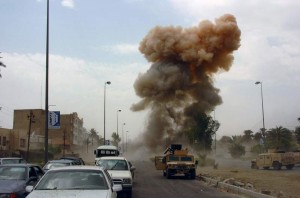
The United States, Iraq, Afghanistan, Iran, Syria and Israel Part 2
October 7th of 2013 marked the 12th anniversary since the United States invaded Afghanistan as the war drags into its 13th year. The Afghanistan war and the Iraq war have been estimated to cost tax payers up to 6 trillion dollars. This year marks the 10th anniversary of the Iraq War – an illegal war launched despite the global protest in the streets.
Phyllis Bennis:
- On the one hand it was a huge victory for the U.S. and the anti-war mobilization effort, that we managed to prevent what was a very imminent US strike. The British also had their missiles ready to go. They were very close.
- In combination with the British Parliament decision to say no, led to a huge shift in what the Obama Administration was prepared to do.
- It turns out they were prepared to go to war without UN permission. They were ready to do without the UN, without NATO, without the Arab League, but not without the Brits.
- This was a political decision, this wasn’t rooted in concerns about international law or any kind of strategic or military necessity.
- When it was turned over to Congress, a lot of organizations mobilized and said you know what, we’re not going to let this happen.
- Members of Congress were reporting that their emails were running 500 to 1, 800 to 1, 1000 to 1 against US military intervention.
- What we found is that people were not willing to sign on to another war after so many failed wars in the region.
- You can call it war fatigue but it’s really about learning a lesson, that war is not an answer to these problems.
- Given that there have been 100 thousand victims in this war (Syria) about a third of them civilians, about 43 percent regime soldiers and militia, about 18 percent rebel soldiers. The rest were civilians.
- To claim this was all about the humanitarian consequences, simply, that’s not the case.
- The voices that have been marginalized the most are the original political opposition in Syria, who were incredibly brave and courageous, still out there fighting.
- The regime in Syria was forced to sign on to the chemical weapons treaty. That’s huge, there are only 7 countries in the world that had not signed that treaty.
- Israel of course being another one.
- The number of people killed with chemical weapons in Syria is tiny compared to the number of people killed with conventional weapons.
- The five wars in Syria, the regional power struggle, the sectarian war, the US-Russian war, the US-Israel vs. Iran war, those are still underway in Syria.
- President Rouhani, the new president of Iran, was on a major charm offensive.
- Rouhani has said ” I have the backing of the Supreme Leader in a new approach to our nuclear negotiations.”
- There are enormous pressures in the U.S from the arms industry, from AIPAC, from hawks in Congress of all sorts.
- The Palestinians are the ones that will pay the price if there is an agreement between the US and Iran because the US will be determined to give Israel something.
- Iraq has become as violent as it was in the height of the sectarian wars of 2006 and 2007.
- Hundreds of people are being killed on a daily basis. It’s a disaster. Much of that is the result of the exploding war in Syria. Syria and Iraq share a long border. It’s a very porous border.
- The division of Libya into 2 or 3 regions is a very likely possibility.
- Saul Landau was a giant in our movement, he made one of the first films about Fidel. It was called Fidel it was made in 1960 a year after the revolution.
- He died about a month ago after a 2 year battle with a very virulent cancer.
- Saul had been at IPS almost at the beginning. He wrote the book Assassination on Embassy Row that documented with such precision on how Operation Condor had gone forward.
Guest – Phyllis Bennis, directs the New Internationalism Project at IPS. She is also a fellow of the Transnational Institute in Amsterdam. She has been a writer, analyst, and activist on Middle East and UN issues for many years. In 2001 she helped found and remains on the steering committee of the U.S. Campaign to End Israeli Occupation. She works closely with the United for Peace and Justice anti-war coalition, co-chairs the UN-based International Coordinating Network on Palestine, and since 2002 has played an active role in the growing global peace movement. She continues to serve as an adviser to several top UN officials on Middle East and UN democratization issues.
—————————————————————-
Afghanistan War, CIA Sponsored Terror, Civil Liberties, Criminalizing Dissent, Guantanamo, Habeas Corpus, Human Rights, Political Prisoner, Surveillance, War Resister
Podcast: Play in new window | Download
Updates:
—-
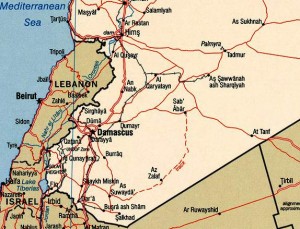
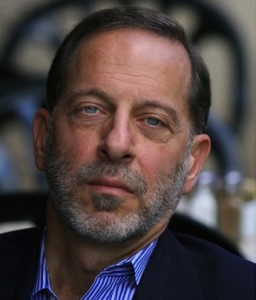
United States Moves To Intervene In Syria Civil War
According to the United Nations, nearly 2 million refugees have fled the civil war and unrest in Syria. Why is the United States moving to intervene? Professor Rashid Khalidi, an historian on the Middle East and the Edward Said Professor of Modern Arab Studies at Columbia University, and director of the Middle East Institute of Columbia’s School of International and Public Affairs joins hosts to discuss the history of the conflict and who stands to gain if the US intervenes.
Professor Rashid Khalidi:
- This is another case where the United States seems to me at least edging sideways blindly without understanding or thinking, frankly into another regional civil war which has the potential for developing into a regional conflict.
- We got involved in an Iraqi civil war, we helped create an Iraqi civil war after the occupation of Iraq. We created al-Qaeda and other horrible manifestations as part of the war against the Soviets and then got involved in what is in effect an Afghan civil war.
- The United States is about to and I hope I’m wrong, put its into a meat grinder and blindly, heedlessly push the button.
- This is a horrific conflict, with no good guys on either side. You have a horrific regime which very likely used these horrible weapons against the rebels and its own population.
- You have on the other side people who are not white knights, in fact they just as soon be killing Americans as butchering Shia or cutting the heads off people. Those are the forces that dominate. Not the opposition to the regime, but the fighting forces.
- These are people who don’t wish any of us well.
- The United States is going to war for reasons of imperial overreach, for reasons that have to do with domestic politics.
- For Iran, the Syrian regime is its most important regional ally. The Iranians see this as a make or break conflict for their regional influence.
- At the same time the new Iranian government is clearly interested in cutting a deal with the United States.
- I think a deal is within reach on nuclear issues and other issues.
- Israel would probably like to see the Syrian side bleed themselves endlessly.
- What they’re probably doing is through their supporters in this country, is quietly pushing this president toward an American intervention which is not in the American national interest but in some ways.
- I was there when he said, ‘I’m not against all wars, I’m against stupid wars.’ This is quintessentially a stupid war.
- It’s the fifth or the eighth move on each side that has the potential for escalation.
- There is a consensus of idiocy among the so-called experts.
- I have to say this, the Israelis encouraged this.
- It’s a civil war with a lot of bad guys on both sides. That is what we’re about to get directly involved with.
- Why the United States should be against the Assad regime, its a bad regime, is unclear to me, while its clear to me Israel would like a bunch of tiny, weak, divided, sectarian states such that it could lord over the region completely.
- Most people in the Arab world have a profound suspicion of the United States, because its joined at the hip with Israel, always, everywhere since time immemorial.
- On the other hand you have authoritarian regimes, petro-monarchies, Saudi Arabia, the Emirates, Kuwait, Qatar which are hell bent on imposing their regime on Syria.
- There are a lot of interests tied up in the United States lording it over everybody and acting as if it has the right and the power to decide everything everywhere. We don’t.
Guest – Professor Rashid Khalidi, is the Edward Said Professor of Arab Studies at Columbia University. He received his B.A. from Yale University in 1970, and his D.Phil. from Oxford in 1974. He is editor of the Journal of Palestine Studies, and was President of the Middle East Studies Association, and an advisor to the Palestinian delegation to the Madrid and Washington Arab-Israeli peace negotiations from October 1991 until June 1993.
—–
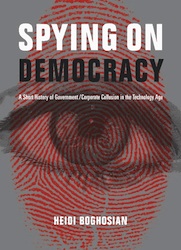
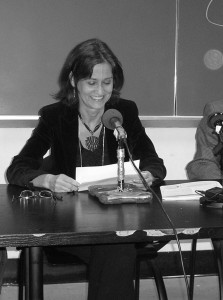
Spying on Democracy: Government Surveillance, Corporate Power, and Public Resistance
Our own Heidi Boghosian has written a powerful book on the history of spying, privacy and how public dissent without surveillance is needed in order for a democracy to thrive. The newly published book is titled Spying On Democracy: Government Surveillance, Corporate Power, and Public Resistance and it reveals in detail how the government acquires your information from sources such as telecommunications companies to compile a data base on “persons of interest.” Since ex-CIA staffer Edward Snowden’s release of top secret documents to the Guardian and Washington Post many are now aware of the frequency and scope to which they are being monitored. What this book has unveiled is how your personal consumer data is being gathered, bundled and sold. The spying, the collecting of phone records, accessing your online activity, all of it is unconstitutional says Heidi Boghosian, co-host of Law and Disorder and the National Lawyers Guild’s Executive Director.
Attorney Heidi Boghosian:
- They create dossiers of our spending habits, of our communication habits.
- The corporations benefit from this which makes them create more equipment for surveillance and almost makes it impossible for the government to perform traditional government functions because they’re so reliant on corporate partners.
- There’s also a revolving door among CEOs of these big companies and high level positions within government intelligence.
- The National Lawyers Guild was spied on by the FBI. More than 1000 agents were assigned to us for nearly 3 decades. They rummaged through our members garbage. We had an infiltrator in Washington DC serving as a staff person.
- They tried to label us (and failed) as a subversive organization.
- The People’s Law Office had also been monitored for years. Apparently across the street from the office an apartment was taken by the FBI who spied on them for their work representing politically active individuals.
- With all of this spying, the chilling effect of knowing that you may be spied on, you conversations may be listened to, changes the way you do business.
- I’ve always been interested in cooperation between municipal public police and private security organizations.
- We’re seeing an entire industry giving birth to Stratfor and other intelligence organizations that exist just to conduct intelligence be it on activists or critics of corporate or government policies, as well as defense contractors beefing up and creating a whole sector of intelligence.
- They are in big contracts with the US government.
- One of the problems constitutionally is they’re not held as private businesses to the same strictures as the US Constitution as we saw recently with the Hemisphere program revelations. We have our government paying AT&T staff to sit next to drug enforcement officers and go through AT&T’s files that go back 26 years. They’re not overseen by a judge.
- My question is how many more agencies of the government are doing this?
- They are getting access to this information through what’s called administrative subpoenas.
- Many mannequins have small cameras embedded in the eyeballs.
- When you’re spying on the fourth estate as its called which is intended to be a watch dog on government you really get to the heart of what democracy is about.
- Without a free press, we don’t have any chance of preserving those fundamental freedoms of First Amendment association and the ability to bring our grievances to the government for redress.
- A student group working with the Coalition of Immokalee Workers got suspicious because a new member on their listserve started asking questions and they did some research and found she owned her own private security company, in fact she was spying on them for Burger King.
- Congress is calling for an investigation for these large data aggragators. Once again, there’s no oversight, there’s no accountability, they go to a variety of sources to gather personal information on us. Some in the public domain, others not.
- They have vast troves, electronic dossiers on each of us.
Guest – Heidi Boghosian, executive director of the National Lawyers Guild. She is the co-host of the weekly civil liberties radio show Law and Disorder on Pacifica’s WBAI in New York and over 40 national affiliates. She received her JD from Temple Law School where she was the editor-in-chief of the Temple Political & Civil Rights Law Review. She also holds an MS from Boston University and a BA from Brown University.
——————————————————-
Afghanistan War, CIA Sponsored Terror, Civil Liberties, Criminalizing Dissent, FBI Intrusion, Guantanamo, Habeas Corpus, Human Rights, Political Prisoner, Prison Industry, Surveillance, Targeting Muslims, Torture, Truth to Power, War Resister
Podcast: Play in new window | Download
Updates:
——-
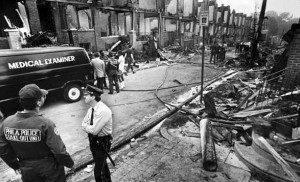

MOVE Bombing: 28th Anniversary
This week marks the 28th anniversary of an armed police mission in Philadelphia that ended in a helicopter bombing of the headquarters of the group known as MOVE. The fire commissioner in that city allowed a fire to rage unabated at 6221 Osage Avenue in West Philadelphia, killing six adults and five children, destroying 65 homes and leaving more than 200 people homeless. Despite two Grand Jury investigations, and a commission finding that top officials were grossly negligent, no one from city government was ever criminally charged. A recent film called Let the Fire Burn, chronicles the events leading up to the conflagration.
Ramona Africa:
- The government, through the media had mislead people to believe that what happened in May of 1985 was because of complaints from neighbors which is absolutely not true.
- What happened on May 13, 1985 happened because of our unrelenting fight for the release of our innocent sisters and brothers known as the MOVE 9 who were arrested in August 1978.
- After years of abuse, physical abuse, judicial abuse by this system, MOVE babies being killed through miscarriage and a 3 week old baby being trampled to death by police, after countless unprovoked beatings of MOVE men and women, children, even pregnant women, MOVE people took a stand and said listen, we are uncompromisingly opposed to violence, we’re a peaceful people. We’re not stupid and we’re not masochistic or suicidal.
- We do believe in self defense which is the law, the law of life. There is not a species on this Earth that doesn’t defend itself, when threatened, when attacked.
- When MOVE took that stand, the government became enraged.
- They alleged housing code violations, and they wanted MOVE to move out of the home based on housing code violations.
- MOVE people wouldn’t go along with that. A judge gave MOVE people til August 1 to get out.
- On August 2, 1985, a judge issued warrants on any MOVE people he knew of including people he knew were not in the house.
- After the warrants were issued, hundreds and hundreds of cops were sent out to our home.
- They shot thousands of bullets into that house. The fire department used deluge hoses to flood our home.
- The officer that was killed was standing on street level while everybody including the police acknowledged that all MOVE people were in the basement of our home.
- This policeman was shot from a bullet traveling on a downward angle.
- Hours after I was arrested on August 17, the city sent a demolition team out and completely demolished MOVE’s home which was the scene of the crime.
- The MOVE 9 trial was a bench trial, not a jury trial.
- They did it to silence our righteous protest and our unrelenting fight for the release of our family the MOVE 9.
- They came out to our home on Mother’s Day, May 12 1985, with warrants they obtained on May 11.
- The Fire Department as in 1978 was their first mode of attack.
- They came out there to kill, that’s the bottom line.
- When their ten thousand rounds of bullets didn’t kill us, the water hoses, the tear gas didn’t do the job, they concocted a bomb made from powerful military explosives, C4.
- They got the C4 from the federal government, from the FBI.
- The state police helicopter flew over our home without any warning, and two Philadelphia Police bomb squad police officers dropped that bomb on the roof our home. It ignited a fire. They made a conscious decision not to put the fire out.
Guest – Ramona Africa, the sole adult survivor of the 1985 police bombing of the home occupied by members of the MOVE organization. Email Ramona – onamovelleja (at) gmail.com
——–
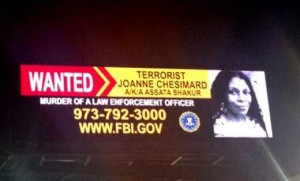

Assata Shakur Placed On FBI Terror List
Last week, the FBI placed Assata Shakur on its Most Wanted Terrorists list, while the state of New Jersey raised the bounty on her head to 2 million dollars. These actions fall on the 40th anniversary of the 1973 shoot out in in which police allege Shakur killed a police officer during a traffic stop on the New Jersey turnpike. Assata also known as JoAnne Deborah Byron is an African American activist was a member of the Black Panther Party and the Black Liberation Army. Assata Shakur: Understanding the politics behind the FBI’s new attack.
Eugene Puryear:
- I think why a 65 year old grandmother has been put on the FBI terrorist list is a reflection of the United States government’s fear of that which opposes it.
- Assata Shakur was part of the 60s movements . . . a movement that the Nixon administration attempted to criminalize, to say that political dissent and political opposition to the US government and its imperial moves around the world.
- She does fit the profile of what the US government has been trying to perpetuate for the last 30 years, in a sense an extension of COINTELPRO.
- One person’s terrorist is another person’s freedom fighter.
- Assata Shakur, her actions and beliefs is certainly not something that is beyond the pale but the US government view her as a terrorist.
- By placing her on this terrorist list, it’s a way of criminalizing dissent.
- Assata’s trial was moved several times, it was placed in counties that were mostly wealthy, mostly white where pre-trial publicity around the case had biased people in a major way against Assata Shakur.
- When the government wants to put someone away and they know they don’t have the evidence they want to do everything possible to both manipulate the venue and also bring in people whose predisposition will make them more likely to believe the government’s version of events.
- Assata was in a position to be put in prison for the rest of her life in these human-breaking conditions.
- The day before this happened, the US government refused to remove Cuba from the state sponsors of terrorism list. This is used in part for keeping Cuba on that list.
- Also to give a chilling effect to progressive movements in the United States.
- The US seems to be redefining what are terrorist actions and what its responses are.
- The lock down of Boston, the reclassification of Assata Shakur, the issuing of the drone memo of what eminence actually means.
- The US is attempting to create enough ambiguity in the statutes.
Guest – Eugene Puryear, Eugene is a writer and on the editorial board of the Liberation, Newspaper of the Party for Socialism and Liberations.
—–
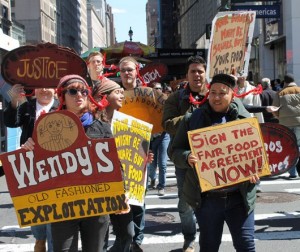

CIW – Fair Food Program: Wendy’s
Last year Trader Joe’s and the Coalition of Immokalee Workers signed an agreement that formalized the ways in which Trader Joe’s support the CIW’s Fair Food Program, a hard won victory.. Since then efforts have turned to companies such as Publix supermarkets in Florida and the Wendy’s fast food chain. Recently, Fair Food activists across the country visited their local Wendy’s to deliver a message: It’s time to join the rest of the fast-food industry and support the Fair Food Program.
Emilio Faustino:
Translator Joe Parker:
- We’re farm workers who come from the town Immokalee, Florida that’s based in the Southwestern part of the state. Our community is a farm worker community and for many years we faced a number of different kinds of exploitation, poverty, wage theft, physical and verbal abuse as well as sexual harassment of many women working in the fields.
- We began our campaign focused on the big corporate buyers of the produce that we pick back in 2001 in an effort to improve wages and working conditions in the fields, we began with Taco Bell and from there had campaigns with McDonald’s, Burger King, until as you said 11 other companies came to the table to dialogue with farm workers and work to improving those wages and working conditions in their supply chains.
- We’re here in New York focused on Wendy’s fast food chain. For a number of years the coalition has been sending letters to the fast food chain asking them to join the Fair Food program. We launched a public campaign with them earlier this year but thus far they have ignored us.
- We want Wendy’s to do what most of these corporations have done, that’s pay one penny more for each tomato that they buy.
- We’re here for the Wendy’s shareholder action, and we’re going to be organizing an protest on Saturday, May 18, at 2PM at Union Square to send a message to company’s investors that this is something that farmworkers in Wendy’s supply chain really deserve. There will also be a number of actions taking place that day all over the country in a number of communities standing together with the CIW.
- Contact: www.ciw-online.org, email: workers@ciw-online.org, 239-657-8311
Guest – Emelio Faustino, farm worker, CIW activist living in Florida. He is among other workers picking tomatoes by hand for 10-12 hours per day, while getting paid 50 cents per bin, or about 200 to 283 dollars per week.
Guest – Joe Parker, CIW spokesman and translator.
—————————————————–
CIA Sponsored Terror, Civil Liberties, Criminalizing Dissent, Extraordinary Rendition, Habeas Corpus, Human Rights, Political Prisoner, Prison Industry, Prosecution of the Bush Administration, Supreme Court, Targeting Muslims, Torture, War Resister
Podcast: Play in new window | Download
Updates:
- Please Sign the Lynne Stewart Compassionate Release Petition
- Please Also Write to: Charles E Samuels Jr. / Federal Bureau of Prisons /
- 320 1st Street Northwest / Washington DC 20534
- Anniversary of Collateral Damage Video Release
- University Stadium Victory – GeoCorp Prisons
—
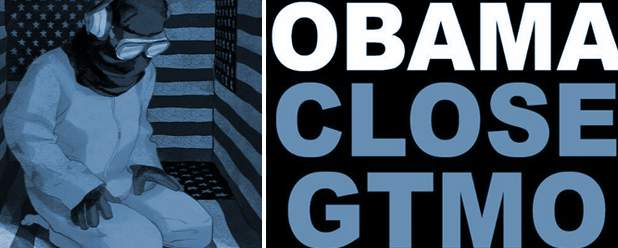
Guantanamo Hunger Strike Update
Attorney Omar Farah speaks with Michael Ratner about a hunger strike at Guantanamo Bay Prison with more than half of prisoners from Camp 5 and 6f participating. Farah says the hunger strike was triggered by an arbitrary crackdown by the prison administration including cell searches and a search of the prisoner’s Qurans. This is viewed as out right desecration. More than half of the entire prison population has been cleared for release by every prominent national security and law enforcement agency in the US government, that includes the DOD, DHS.
Guest – Omar Farah joined the Center for Constitutional Rights in 2012 as a staff attorney in the Guantanamo Global Justice Initiative. Omar was previously in private practice, working mostly in the area of international commercial arbitration. Since 2008, he has represented several prisoners detained at Guantanamo Bay in habeas corpus litigation in federal court.
———
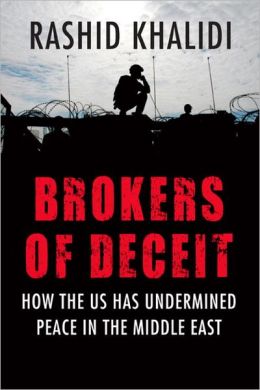
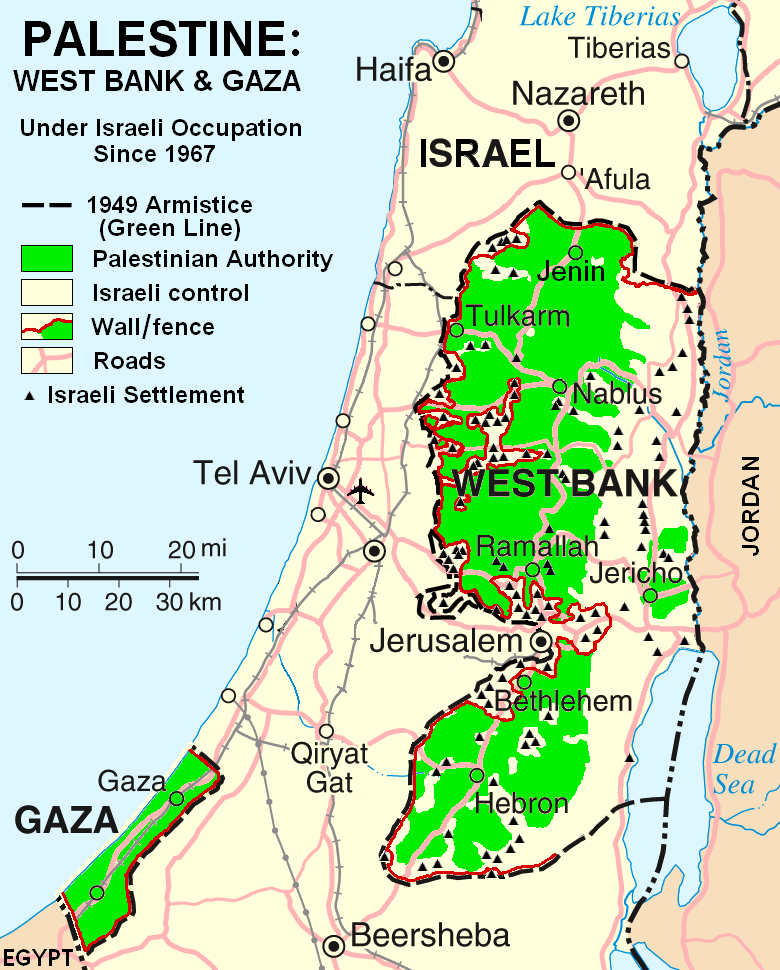
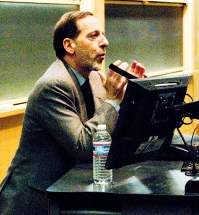
Brokers of Deceit: How the U.S. Has Undermined Peace in the Middle East
While adviser to the Madrid and Washington Palestinian-Israeli negotiations, author and historian Rashid Khalidi collected documents, memos and meeting minutes as a research foundation for his recently published book Brokers of Deceit: How the U.S. Has Undermined Peace in the Middle East. The book focuses on 3 periods of opportunity for the United States to broker peace, one in the late seventies, the early nineties and 2010. This critical analysis addresses the basic distortions in language that has corrupted the peace processes. Rashid Khalidi is an American historian of the Middle East, the Edward Said Professor of Modern Arab Studies at Columbia University, and director of the Middle East Institute of Columbia’s School of International and Public Affairs, he joins us today to talk about his book and also the ongoing destabilizing hostility in Syria.
Professor Rashid Khalidi:
- Let me read to you what Orwell says, “the slovenliness of our language makes it easier for us to have foolish thoughts. If thought corrupts language, language can also corrupt thought. Bad usage can spread by tradition and imitation even by people who should and do know better.”
- The argument I’m making in this book is much of the language used by pundits and politicians about the Middle East and the so called peace process, between the Palestinians and the Israelis is really corrupt language.
- One of the chapters in the book is devoted to the period when I was an adviser to the Palestinian delegation and negotiations from 1991-1993 starting in Madrid and continuing to Washington.
- If you go back to Madrid in October 1991, there were under 200 thousand Israelis living in the occupied West Bank and occupied East Jerusalem. Today, there are nearly 600 thousand of them.
- United States has been responsible for exacerbating the problem in effect by saying the only way to deal with this issue of occupation and settlement is through negotiations mediated by us.
- The United States in the meantime has put its big thumb on the scale in favor of the Israelis preventing a resolution of the problems.
- The first episode I talk about in the book has to do with the follow on to Camp David in the wake of the Lebanon War in 1982 when Israel invaded and 50 thousand Palestinians and Lebanese were killed and wounded.
- I site at great length a now declassified document by a CIA analyst which one of my students actually found.
- The idea of Palestinian self determination doesn’t exist anywhere in the Oslo Accords signed by the PLO and Israel in 1993 and afterward.
- Autonomy and self determination are used by people in American political parlance and Israeli political parlance in ways that do violence to the real meanings of these words.
- Obama fits the pattern of every president since President Carter, with the sole exception of George W. Bush.
- Obama has adopted wholesale and entire Israeli narrative as to the idea that Israel is the victim.
- There is a people in existential danger that’s the Palestinians, the people faced with elimination, extermination, not physically but as a collective.
- Oslo was a terrible deal for the Palestinians. As a result of Palestinian failures since the 90s, a situation has emerged where we have one state and one sovereign body between the Mediterranean and the Jordan River.
Guest – Professor Rashid Khalidi, is the Edward Said Professor of Arab Studies at Columbia University. He received his B.A. from Yale University in 1970, and his D.Phil. from Oxford in 1974. He is editor of the Journal of Palestine Studies, and was President of the Middle East Studies Association, and an advisor to the Palestinian delegation to the Madrid and Washington Arab-Israeli peace negotiations from October 1991 until June 1993.
—–
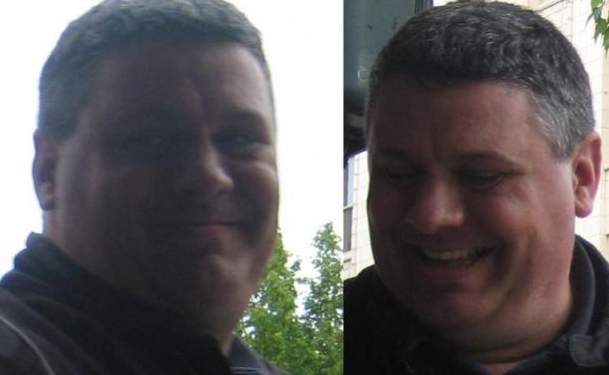
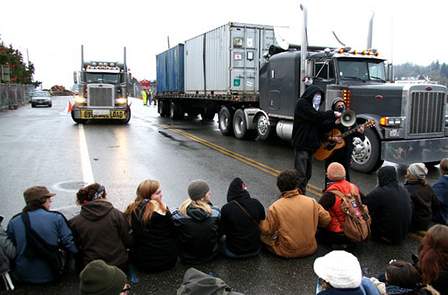
Judge Oks Civilians Right to Sue Military For Spying On Peace Activists
In a recent ruling, the Ninth Circuit Court of Appeals ruled that a lawyer’s challenge to military spying on peace activists can proceed. This ruling is the first time a court allowed civilians to sue the military for violating their First and Fourth Amendment rights. National Lawyers Guild attorney Larry Hildes brought the lawsuit Panagacos v Towery in 2009 on behalf of a group of Washington state antiwar activists who discovered they were infiltrated for 2 years by John Towery, an employee at a fusion center inside a local Army base. The antiwar activists group Port Militarization Resistance sought to oppose the wars in Iraq and Afghanistan through civil disobedience. The lawsuit also names, the Army, Navy, Air Force, FBI, CIA, Department of Homeland Security and other law enforcement agencies.
Attorney Larry Hildes:
- Brendan Dunn was activist in Olympia, he was arrested in Seattle basically for sitting while anarchist.
- The Olympia Police Department cracked down on the Wobblies and the IWW for having newspaper boxes for which they paid for and took all the papers.
- We got them back, but Brendan got curious about what was going on, did a state public records act request for all emails and all intelligence to the city of Olympia concerning anarchists or the IWW.
- What he got back instead was hundreds and hundreds of pages of what are called “force protection memos” and “threat assessments” from Ft. Lewis about Port Militarization Resistance, a group that he was involved with that did protest against the use of public ports for shipment of Striker Brigade equipment to the occupation in Iraq and Afghanistan.
- He started looking at them and every police department and every military agency from north of Seattle to Portland was on this list. The FBI was on this list, Homeland Security, every branch of the military.
- It was detailed discussions of what PMR was planning, what they were going to do, how to fight it. The author of a lot of this was John Towery.
- PMR looked Towery up on Facebook and there’s a picture on Towery’s FB page of John Jacob who had been coming to PMR meetings for several years. Very closely involved with PMR in fact he ran their list serve on Rise Up.
- So they did some more checking. They looked up his voter registration, they got an address and the address matched John Jacobs.
- He was 20 years older than everyone else. I don’t know how but he blended in. He went to events, he brought his kids. He was very very good at what he did.
- Brendan considered him a close friend. Brendan and another member confronted him at a cafe in Tacoma and he said “yes, I’ve been spying on you. I’m doing it for your own good, there are other spies watching you that mean you much more harm than I do.”
- We do know that the Army at least one more spy. We caught the Coast Guard spy. There were 2 officers from the Tacoma Police Department’s Homeland Security Committee.
- The police would show up at unannounced demonstrations. The MP’s, local police and state patrols would already be there and everyone would be arrested as they were getting out of their cars.
- The Portland Militarization Resistance was a few dozen people. They were very creative, they had figured out a choke point for the military.
- The equipment would go out 3 weeks before the troops. If they couldn’t get the equipment there. They couldn’t send the troops.
- If they couldn’t send the equipment and the troops then no war.
- The succeeded in scaring the heck out of the military by these very peaceful acts of civil disobediance.
- They can’t arrest them before they get to the demonstration or before they even do anything.
- They think dissent against their wars is the enemy which scares me a great deal.
- Where else are they doing this, how much are they doing this?
Guest – Attorney Larry Hildes, an NLG member and one of the attorneys involved in bringing the case Panagacos v Towery.
————————————————————————–
CIA Sponsored Terror, Civil Liberties, Criminalizing Dissent, FBI Intrusion, Habeas Corpus, Human Rights, Military Tribunal, Political Prisoner, Surveillance, Targeting Muslims, Torture, Truth to Power
Podcast: Play in new window | Download
Updates:
——
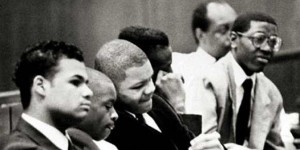
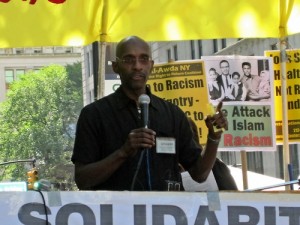
Central Park Five Civil Suit
On April 19, 1989 a group of five black and Latino teenagers were arrested and convicted for the brutal rape of a white female jogger in Central Park, New York City. It was one of the highest profile criminal cases in the city. A New York court overturned the convictions of the five teenagers after a serial rapist confessed to the crimes. By this time of this confession, the five defendants had already served sentences of 7and 13 years. Now, the city of New York is refusing to settle a $250 million decade-long federal civil rights suit brought by the defendants. Attorney Roger Wareham talks more about the case and the Ken Burns documentary on the Central Park Five that could provide footage for the federal civil lawsuit.
Attorney Roger Wareham:
- I’m part of a team of lawyers among five firms that represent the five defendants.
- She almost died. She lost 75 percent of the blood in her body that night.
- The police at some point arrested 30 youths who had allegedly been in the park earlier that night. Some of them were charged with attacking people jogging in the park.
- Most of them had been released, these five were in custody.
- Maybe four or five hours after they were arrested the police received word of this woman who was near death.
- So they held these five children for questioning which basically became and interrogation, which basically became a coerced false confession where each one of them implicated the other ones in the rape and attack of this woman.
- Even though none of them knew each other or what actually happened because they didn’t do it, they just wanted to go home.
- By the time the parents became part of the process, the false statements had already been elicited.
- Especially when a black man is a accused of touching, raping a white woman, logic, justice, objectivity, evidence goes out the window and there’s a presumption of guilt.
- They went to trial and were convicted even though there was no forensic evidence.
- Once they were released from prison they had to register as sexual predators.
- Thirteen years after their conviction, the person who actually committed the crime came forward and admitted he’d done it.
- He was arrested after a failed attempt at a rape. There was an m.o. that he employed with the rapes that he conducted.
- I’m part of a political organization called the December 12 Movement.
- Manhattan’s District Attorney’s office had done a very thorough investigation and this is the same office that had prosecuted them.
- They put forth a really damning affirmation in support of our motion basically admitting they had prosecuted the wrong people, errors had been made. It was clear that the one and only perpetrator was Mateas Raes and they were not going to retry the case.
- Their convictions were overturned 10 years ago, in December 2002.
- Why hasn’t it been settled? You look to Police Commissioner Kelly who endorsed the report.
- Subpoenaing the outtakes is a reflection of their desperation. See, they know the truth. They’re floundering around looking for different straws to grab at.
- Contact the December 12th Movement directly at 718-398-1766.
Guest – Attorney Roger Wareham is a lawyer and political activist of over four decades. He is a member of the December 12th Movement, an organization of African people which organizes in the Black and Latino community around human rights violations, particularly police terror. Wareham is also the International Secretary-General of the International Association Against Torture (AICT), a non-governmental organization that has consultative status before the United Nations.
Since 1989, he has annually presented evidence of human rights violations facing people of color in the United States and other parts of the world at assemblies of the United Nations’ Human Rights Council (formerly the Commission on Human Rights) and its other bodies that meet in Geneva, Switzerland. His work was instrumental in having Mr. Maurice Glele, the U.N. Special Rapporteur on Racism, Racial Discrimination, Xenophobia and Related Intolerance; conduct the first U.N. investigation of the United States in history. Roger Wareham was an active organizer of and participant in the United Nations’ World Conference against Racism held from August 30 – September 7, 2001 in Durban, South Africa.
———————————————————————————




















